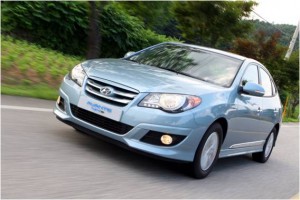
Hyundai has also just launched its first hybrid electric vehicle, Elantra LPI, in the protected Korean market. The hybrid has a 1.6-liter engine that runs on LP gas, half the price of gasoline in Korea. It delivers a fuel economy rating of 17.8 km/l (42 mpg) and CO2 emissions of 99 g/km.
Hyundai Motor Company sold 1,403,931 vehicles during the first half of 2009, as sales dropped almost 6% from the year earlier period.
South Korea’s largest automaker, however, posted a net profit increase of 10.4%, to Won 1,036.8 billion, in the first six months of the year from Won 939.6 billion a year earlier. Sales declined 18.5% to Won 14.1 trillion from Won 17.3 trillion.
As a result operating profit fell 31% to Won 811 billion since exports from domestic Korean plants declined from a year earlier, and the company increased marketing expenses to “raise brand awareness and enhance overseas dealers.”
Marketing expenses basically more than doubled from 2.8% of revenue to 6% in the period.
The marketing gambit, though costly, showed some results. Hyundai Motor reached 5% global market share in the first half of this year for the first time ever, amid an estimated 15% decline in global automobile demand, compared to a year earlier. This result was achieved by expanded share in developed countries including U.S., China and in Europe, as the automaker boosted expanded marketing activities in local markets.
Results were especially notable in China, now the world’s largest auto market. Hyundai sold 257,000 vehicles there in the first half, a 56% rise from a year earlier, mainly helped by its “Chinese exclusive” models.
Hyundai Motor has also just launched its first hybrid electric vehicle, Elantra LPI Hybrid, in the protected Korean market this month under the Avante badge and claims to have orders for more than 1,000. The hybrid has a 1.6-liter engine that runs on LP gas, which is half the price of gasoline in Korea, and delivers a fuel economy rating of 17.8 km/l (42 mpg) and CO2 emissions of just 99g/km to qualify as a Super Low Emissions Vehicle (SULEV). Taxpayer subsidized prices are in the $16,000 to $18,000 range.
There are no immediate plans for exports of the Elantra LPI Hybrid but feasibility studies are currently underway in overseas markets where a good LPG refuelling infrastructure exists.
In addition to five-year/100,000-km powertrain warranty, Hyundai will offer a six-year/120,000km warranty for the lithium ion polymer battery, inverter and other key electronic and electrical components.
The Korean giant is clearly targeting Japanese makers such as Toyota and Honda (it rarely fails to compare itslef with Honda in press releases) with their well established environmental reputations.
Hyundai says its efforts to develop highly fuel-efficient and environmentally-friendly cars, such as plug-in hybrid and fuel cell vehicles, will continue and more announcements will be forthcoming.
It is predicting a profitable second half of this year, though, helped by introduction of two new conventional models, the Sonata sedan and Tucson crossover. For the year, Hyundai is predicting sales of 3 million vehicles.
